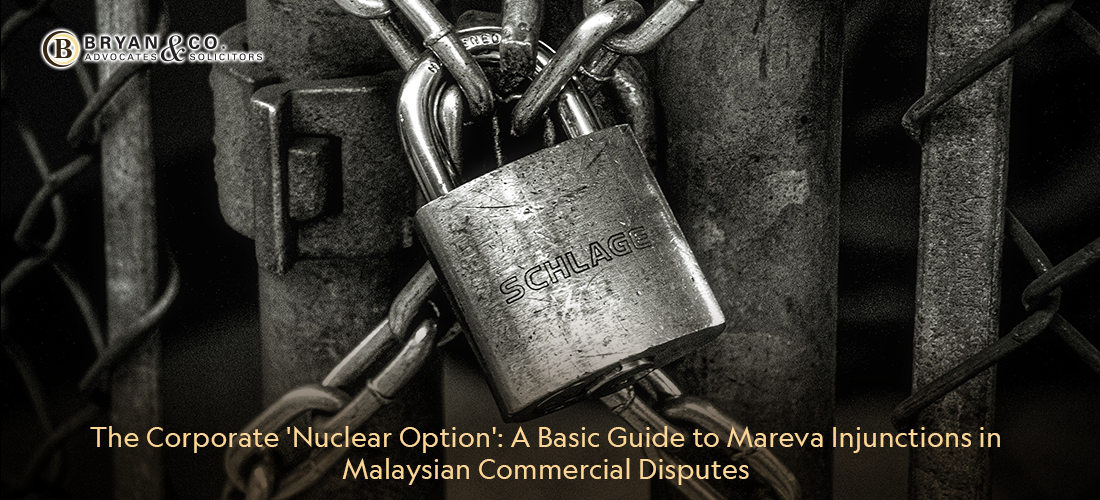
In the high-stakes world of commercial disputes, the fear that a defendant might hide or transfer assets to avoid a future judgment is a very real concern. When faced with this risk, waiting for a trial to conclude can be a gamble. This is where Malaysian law provides a powerful, pre-emptive tool known as a Mareva injunction, often called an asset freezing order.
Colloquially considered the “nuclear option” in civil litigation, a Mareva injunction can paralyse a defendant’s financial operations overnight. This article explains what this drastic order entails, the stringent requirements to obtain one, and the critical implications for businesses on either side of the dispute.
What Exactly is a Mareva Injunction?
Originating from the English case of Mareva Compania Naveria SA v. International Bulkcarriers SA [1980] 1 All ER 213, a Mareva injunction is a temporary court order that freezes a defendant’s assets, preventing them from being dissipated or moved out of the court’s jurisdiction. It doesn’t decide the winner of the main legal dispute; instead, its purpose is purely protective. It acts as a judicial “pause button,” ensuring that if the plaintiff eventually wins the case, there will be assets available to satisfy the judgment.
Its power lies in its element of surprise. A Mareva injunction is typically sought ex parte, meaning the application is made to a judge without the defendant’s presence or knowledge. The defendant often first learns of the order when their bank informs them their accounts are frozen.
The High Bar: Key Requirements to Secure a Freezing Order
Courts do not grant Mareva injunctions lightly due to their severe impact on the defendant. The applicant (the plaintiff) must convince the court of the following key elements:
This doesn’t mean the plaintiff must prove they will win, but they must show a strong, credible case against the defendant in the underlying legal claim.
The High Court in SRC International Sdn Bhd & Anor v Dato Sri Mohd Najib bin Hj Abd Razak [2022] 10 MLJ 95 opined that a ‘good arguable case’ is one which is more than barely capable of serious argument but not necessarily one which has to be better than 50% chance of success.
The plaintiff must provide solid evidence that the defendant has assets located in Malaysia. In certain circumstances, a worldwide Mareva injunction can be obtained, freezing assets globally.
This is usually the most critical and challenging requirement. The plaintiff must present concrete evidence suggesting a real risk that the defendant will dispose of, hide, or move their assets to frustrate the enforcement of any future judgment. A mere suspicion is not enough; there must be evidence of, for example, a lack of commercial morality, unusual asset transfers, or the defendant’s intention to leave the jurisdiction.
On the Receiving End: The Impact of a Mareva Injunction
Being served with a Mareva injunction can bring a business to a standstill. The order typically extends to all assets, including bank accounts, properties, and shares.
However, the order is not meant to be punitive. It will usually include important exceptions to allow the defendant to continue functioning, such as:
- Allowances for ordinary living expenses.
- Provisions for ordinary business expenses, such as paying salaries and suppliers.
- The ability to pay for legal advice and representation.
Ignoring the order is not an option and constitutes contempt of court.
Strategic Considerations for Your Business
For Plaintiffs (Applying for the Injunction):
While powerful, applying for a Mareva injunction carries significant risk. The plaintiff must give an undertaking in damages. This is a formal promise to the court to compensate the defendant for any losses suffered because of the injunction if it is later found that the order should not have been granted. This holds the plaintiff accountable and deters frivolous applications.
For Defendants (Served with the Injunction):
Time is of the essence. A defendant can apply to the court to set aside the injunction. This can be done by, inter alia, challenging the evidence presented by the plaintiff, proving there is no real risk of dissipation, or demonstrating that the plaintiff failed to provide full and frank disclosure in their ex parte application.
Request Appointment
Contact us at +603 3000 8626 or email to general@brycolaw.com
